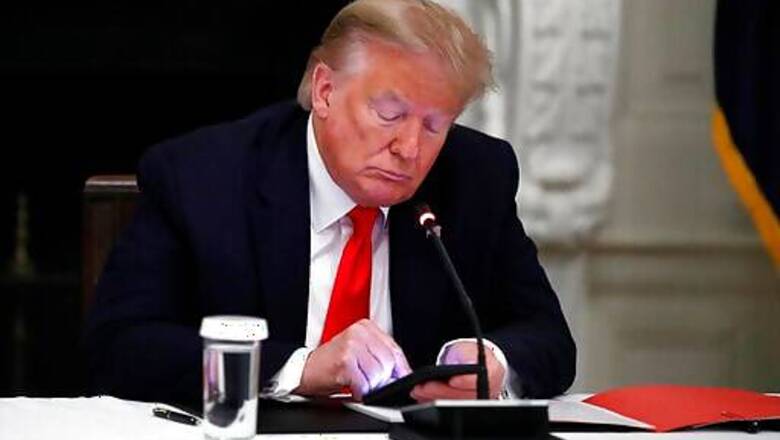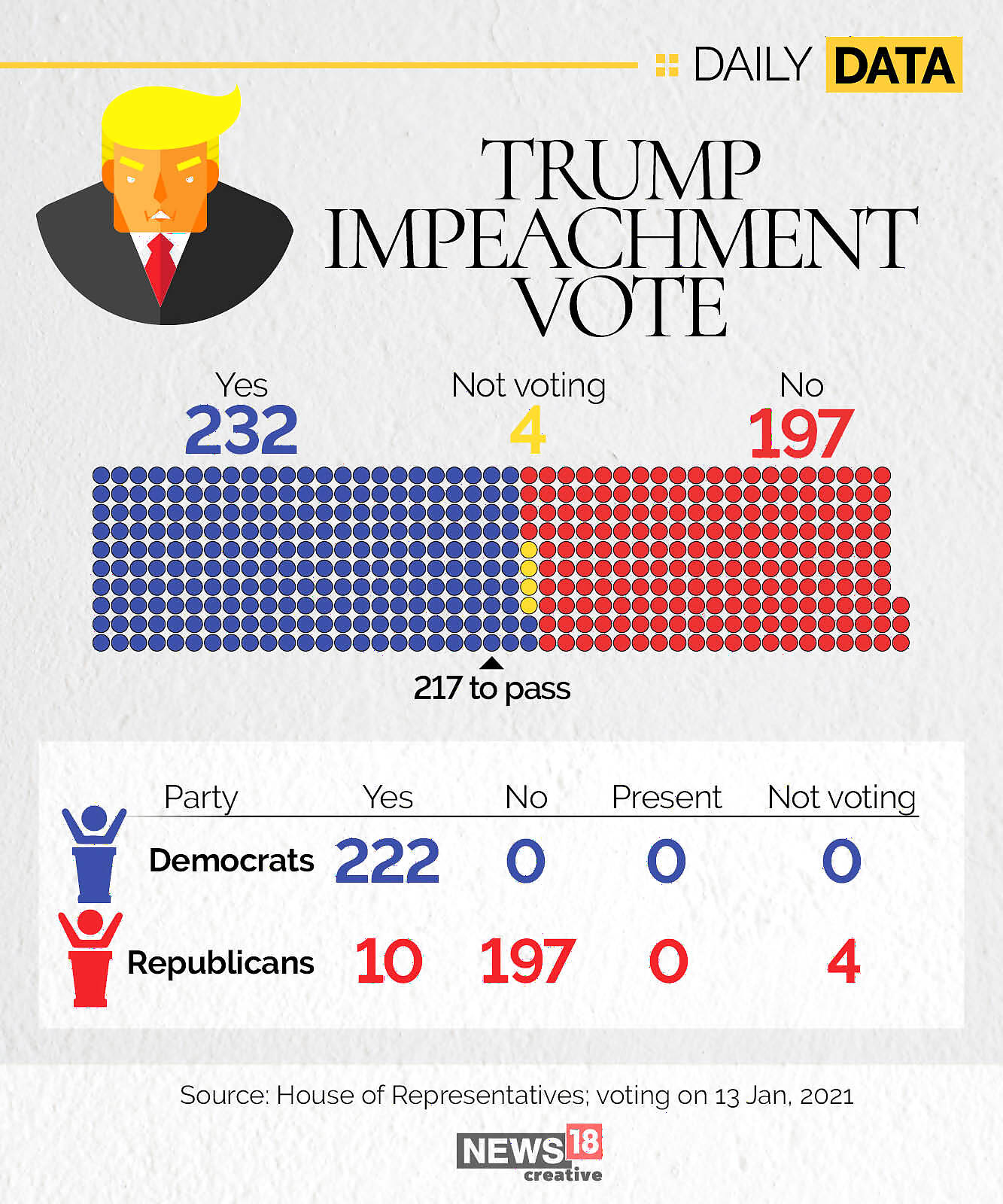
views
In the aftermath of the deadly riots at US Capitol Hill, the House of Representatives on Wednesday passed an article of impeachment accusing President Donald Trump of inciting violence on January 6 that led to the death of one Capitol Hill police officer and a protester.
Three other people also died in what authorities called medical emergencies during a violent riot that witnessed Trump-supporting protesters storm the Capitol and cause the Congress in session to evacuate.
The riots sought to overturn the 2020 election results conforming Joe Biden as US’s next president, however, the efforts of the Trump-supporters were thwarted when Biden presidency was confirmed by the joint session of Congress.

Also read: ‘Enough is Enough’: 10 Republicans On Why They Voted to Impeach Donald Trump
House Votes To Impeach President Donald Trump For The Second Time
The House on Wednesday voted 232-197 to impeach the president, with 10 members of Trump’s Republican Party joining 222 Democrats for his alleged role in the siege of Capitol Hill On January 6, 2020. However this is not the first time that the president faces such charges as he was impeached in 2019 by the Democratic-controlled House for pressuring the leader of Ukraine to dig up political dirt on Biden. However, he was acquitted by the Senate in February 2020.
What Does The Impeachment Entail ?
While Democrats argued that Trump is a threat to democracy, their main goal in this latest impeachment effort seems to ensure Trump never again seeks or holds elected office.
In order for that to take place, the Senate must convict Trump in an impeachment trial after he leaves office, which has never happened before. Also, no sitting or ex-president has ever been convicted in a Senate impeachment trial, which requires a two-thirds majority.
If the Senate convicts Trump presumably during a trial later this year it could then, by simple majority, vote to disqualify him from serving in a future federal office.
When Is Senate Likely To Hold Trial ?
The Senate is currently in recess and is not scheduled to return until January 19.
Democratic Senate Minority Leader Chuck Schumer said Republican Senate Majority Leader Mitch McConnell could call the Senate back early and hold an emergency session but McConnell ruled that out.
Even if the Senate did move “promptly,” there is no way it could conduct a trial before Biden is inaugurated and Trump leaves office, McConnell said in a statement.
“Given the rules, procedures, and Senate precedents that govern presidential impeachment trials, there is simply no chance that a fair or serious trial could conclude before President-elect Biden is sworn in next week,” he said.
There can either be a trial now, or a trial after Jan. 19, Senate minority leader Chuck Schumer said. “But make no mistake, there will be in an impeachment trial … and if the president is convicted, there will be a vote on barring him from running again.”
The House could also decide to delay sending the indictment to the Senate until after the Biden administration makes headway on Senate approval on Biden’s cabinet nominees and vaccine distribution.
What Does Trump Stand to lose if He is Convicted ?
Normally, the conviction of a sitting president at such a trial would result in the president being immediately removed from office. With just days left in office, Trump would likely finish out his term but the Senate can additionally vote to remove the right to run for a second presidential term or for “any Office of honor, Trust or Profit under the United States,” according to the Constitution (Article 1, Section 3).
He could lose some of his benefits under the Former Presidents Act of 1958. Those include a lifetime pension, an annual travel budget and funding for an office and staff. He would still be entitled to Secret Service protection, but Congress could amend the law to make sure Trump loses those benefits.
Mike Pence Refuses to Invoke 25th Amendment
The House’s adoption of the impeachment article on Wednesday, followed a Tuesday night vote that called on Vice President Mike Pence to invoke the 25th Amendment and remove the powers of the presidency from Trump. Right before the vote, the vice president sent Nancy Pelosi a letter saying he would not invoke the 25th Amendment, writing it “would set a terrible precedent.”
“I do not believe that such a course of action is in the best interest of our nation or consistent with our Constitution,” Pence said in the letter adding that the framers of the 25th Amendment intended it to be used in a matter of the president’s incapacitation or disability, such as through illness.
In the ongoing scenario, Congressional Democrats want Pence to invoke Section 4 of the 25th Amendment. Under Section 4, a president can be removed from the office if he/she is deemed incapable to “discharge the powers and duties” of the office, empowering the vice president to discharge those power and duties as acting president. The fourth section of the 25th amendment has never been invoked in the history of the United States.
With the 25th Amendment no longer an option, the House’s move to impeach is being seen as the only attempt to hold Trump accountable for actions many critics say mount to sedition against the US government.
Republicans Divided in their Stance Regarding Trump
Republican House members began to announce they would vote to impeach on Tuesday. The first statements came from House Republican Conference Chair Liz Cheney , daughter of former Vice President Dick Cheney and Reps. John Katko, Adam Kinzinger, Fred Upton and Jaime Herrera Beutler. On Wednesday, Rep. Dan Newhouse also tweeted that he would vote to impeach Trump. For the final vote, 10 Republicans voted in favor of the resolution to impeach.
“The president of the United States summoned this mob, assembled the mob and lit the flame of this attack,” Cheney said in a tweeted statement. “The president could have immediately and forcefully intervened to stop the violence. He did not. There has never been a greater betrayal by a president of the United States.”
While some Republicans have told Trump to resign, including Pennsylvania Sen. Pat Toomey and Alaska Sen. Lisa Murkowski. Republican Sen. Ben Sasse has said he would take a look at what the House approves but stopped short of committing to support it.
Other Republicans have said that impeachment would be divisive. South Carolina Sen. Lindsey Graham, long a key ally of the president, has been critical of his behavior in inciting the riots but said impeachment “will do far more harm than good.”
While some have questioned impeaching the president one week before the end of his term, there is precedent. In 1876, during the Ulysses S. Grant administration, War Secretary William Belknap was impeached by the House the day he resigned, and the Senate convened a trial months later. He was acquitted.
Donald Trump has expressed interest in potentially running for president again in 2024 and a simple majority vote of the Senate could stop him from another White House run.
Read all the Latest News, Breaking News and Coronavirus News here



















Comments
0 comment